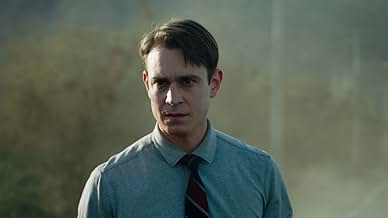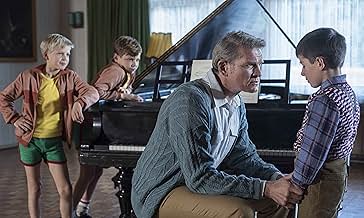Ajouter une intrigue dans votre langueThe Germanic cult 'Colonia Dignidad' abused children, tortured and killed prisoners in its secret compound. Now, with Chilean dictator Pinochet gone, Leo Ramírez, a young federal prosecutor,... Tout lireThe Germanic cult 'Colonia Dignidad' abused children, tortured and killed prisoners in its secret compound. Now, with Chilean dictator Pinochet gone, Leo Ramírez, a young federal prosecutor, must bring its leader Paul Schaefer to justice.The Germanic cult 'Colonia Dignidad' abused children, tortured and killed prisoners in its secret compound. Now, with Chilean dictator Pinochet gone, Leo Ramírez, a young federal prosecutor, must bring its leader Paul Schaefer to justice.
- Prix
- 1 victoire et 1 nomination au total
Parcourir les épisodes
Avis en vedette
Dignidad
Colonia Dignidad was a settlement of German "colonists" founded in 1961 near Parral, a town in central Chile, by former Hitler Youth member Paul Schäffer. During the Pinochet dictatorship, it served as a detention and torture center. On the other hand, the Colony "adopted" male children from the area, who, along with their own members, were abused by Schäffer. It was a German microcosm with a rigid adherence to Protestantism on the part of its members, with Schäffer as the undisputed and all-embracing spiritual leader. It had the only hospital in the area open to the surrounding population, which created a curious support and complicity of the locals with the Colony.
The series Dignidad (a German-Chilean co-production and spoken in both languages) takes place in two periods: in 1977, during the Pinochet dictatorship and in 1997. In this year a judge entrusted the prosecutor Leonardo "Leo" Ramírez (Marcel Rodríguez) with instructing the Schäffer's arrest on child abuse charges. To do this, he will have the support of detective Pamela Rodríguez (Antonia Zegers) to raid the Colony.
The plot will reveal the deep relations of the past of "Leo" with the Colony and an intricate network of complicities at the political, police and diplomatic level, still firm in 1997.
The flashbacks of 1977 are the hardest (and most accomplished) facet of the series: we see some of the characters as children living in the colony that mix of fairy tale with bucolic German songs and dances with typical horror story of the organizations closed and sectarian.
The 1997 story gives an account of the comings and goings of the prosecutor's siege of the Cologne and Schäffer, also impregnated with a personal question. The series aims to reflect an arduous process, increasingly lonely and with many obstacles. But the sequence, instead of accumulating tension, creates a feeling of repetition and a certain fatigue in the viewer. This also occurs because the plot of complicities does not end up taking flight or intensity (as it did in the much superior La Jauría). Perhaps among the most salient is the romantic tension between some of the protagonists.
Rodríguez looks a bit cold in her prosecutor Ramírez and, as always, Zegers stands out in a role similar to her detective in La Jauría.
It is curious that Schäffer (Götz Otto) and the head of the Cologne hospital, Hausmann (Devid Striesow) look exactly the same in 1977 and in 1997. Aspects related to the outcome are not entirely clear either.
In short, a political thriller about the attempt to end the impunity of Colonia Dignidad and its leader Paul Schäffer, which works better in its flashbacks than in its present, since it fails to balance the elements it displays and endow everyone with the same interest.
The series Dignidad (a German-Chilean co-production and spoken in both languages) takes place in two periods: in 1977, during the Pinochet dictatorship and in 1997. In this year a judge entrusted the prosecutor Leonardo "Leo" Ramírez (Marcel Rodríguez) with instructing the Schäffer's arrest on child abuse charges. To do this, he will have the support of detective Pamela Rodríguez (Antonia Zegers) to raid the Colony.
The plot will reveal the deep relations of the past of "Leo" with the Colony and an intricate network of complicities at the political, police and diplomatic level, still firm in 1997.
The flashbacks of 1977 are the hardest (and most accomplished) facet of the series: we see some of the characters as children living in the colony that mix of fairy tale with bucolic German songs and dances with typical horror story of the organizations closed and sectarian.
The 1997 story gives an account of the comings and goings of the prosecutor's siege of the Cologne and Schäffer, also impregnated with a personal question. The series aims to reflect an arduous process, increasingly lonely and with many obstacles. But the sequence, instead of accumulating tension, creates a feeling of repetition and a certain fatigue in the viewer. This also occurs because the plot of complicities does not end up taking flight or intensity (as it did in the much superior La Jauría). Perhaps among the most salient is the romantic tension between some of the protagonists.
Rodríguez looks a bit cold in her prosecutor Ramírez and, as always, Zegers stands out in a role similar to her detective in La Jauría.
It is curious that Schäffer (Götz Otto) and the head of the Cologne hospital, Hausmann (Devid Striesow) look exactly the same in 1977 and in 1997. Aspects related to the outcome are not entirely clear either.
In short, a political thriller about the attempt to end the impunity of Colonia Dignidad and its leader Paul Schäffer, which works better in its flashbacks than in its present, since it fails to balance the elements it displays and endow everyone with the same interest.
This series was torturously slow, and filled with so much ancillary drama it was hard to watch. But I did endure the entire series mostly to see whether justice for the evil perpetrators at Colonia Dignidad were ver brought to justice.
I don't want to be a spoiler (though by reading the historical account you can find out what their fate was), so I will only say that the ending left me quite disappointed.
The acting was OK, but the pace was utterly glacial to the extreme and fictional drama created around the historical aspect was drawn out almost unbearably.
The only reason I gave it a five is for points for someone at least making some kind of film about this hell on earth that existed literally for decades and was guilty of the most heinous acts and crimes imaginable. I'd never heard about it and it is just another clue as to the depths of depravity man is capable of.
In my estimation true justice was never really served in this case, most likely to protect the vast network of the powerful guilty parties involved. Just another sad commentary on the world in which we live.
I don't want to be a spoiler (though by reading the historical account you can find out what their fate was), so I will only say that the ending left me quite disappointed.
The acting was OK, but the pace was utterly glacial to the extreme and fictional drama created around the historical aspect was drawn out almost unbearably.
The only reason I gave it a five is for points for someone at least making some kind of film about this hell on earth that existed literally for decades and was guilty of the most heinous acts and crimes imaginable. I'd never heard about it and it is just another clue as to the depths of depravity man is capable of.
In my estimation true justice was never really served in this case, most likely to protect the vast network of the powerful guilty parties involved. Just another sad commentary on the world in which we live.
Colonia Dignidad was a very dark chapter in the German and in the Chilenean history. We should handle this topic with respect, not as an interesting idea for a fancy fake story.
It is filmed good, the actors play quite well, but still there is the sad feeling about endless fake facts smearing dirt on this serious history.
It's a good story but as has been said by others here it's far too long and slow. It could have been told in a few less episodes with less useless background noise which did nothing to drive the plot. Also some of the acting was wooden and just looked artificial, even groanworthy at times, such as one of the main detectives who kept smiling a truly ghastly smile all the way through. The 'brother' Pedro needs to take more acting lessons. The most unconvincing character in the entire series.
Nevertheless, I watched it all the way through just to see a decent enough conclusion and a hopefully happy one.
Nevertheless, I watched it all the way through just to see a decent enough conclusion and a hopefully happy one.
Le saviez-vous
- AnecdotesProject funded by the Chilean TV Council (CNTV).
Meilleurs choix
Connectez-vous pour évaluer et surveiller les recommandations personnalisées
- How many seasons does Dignity have?Propulsé par Alexa
Détails
Contribuer à cette page
Suggérer une modification ou ajouter du contenu manquant


![Regarder Tráiler [OV]](https://m.media-amazon.com/images/M/MV5BYTE1OGJiYjgtYzhkNy00MDQyLTkyYTEtNzAyMDZhNzY4MThiXkEyXkFqcGdeQXRyYW5zY29kZS13b3JrZmxvdw@@._V1_QL75_UX500_CR0)



























